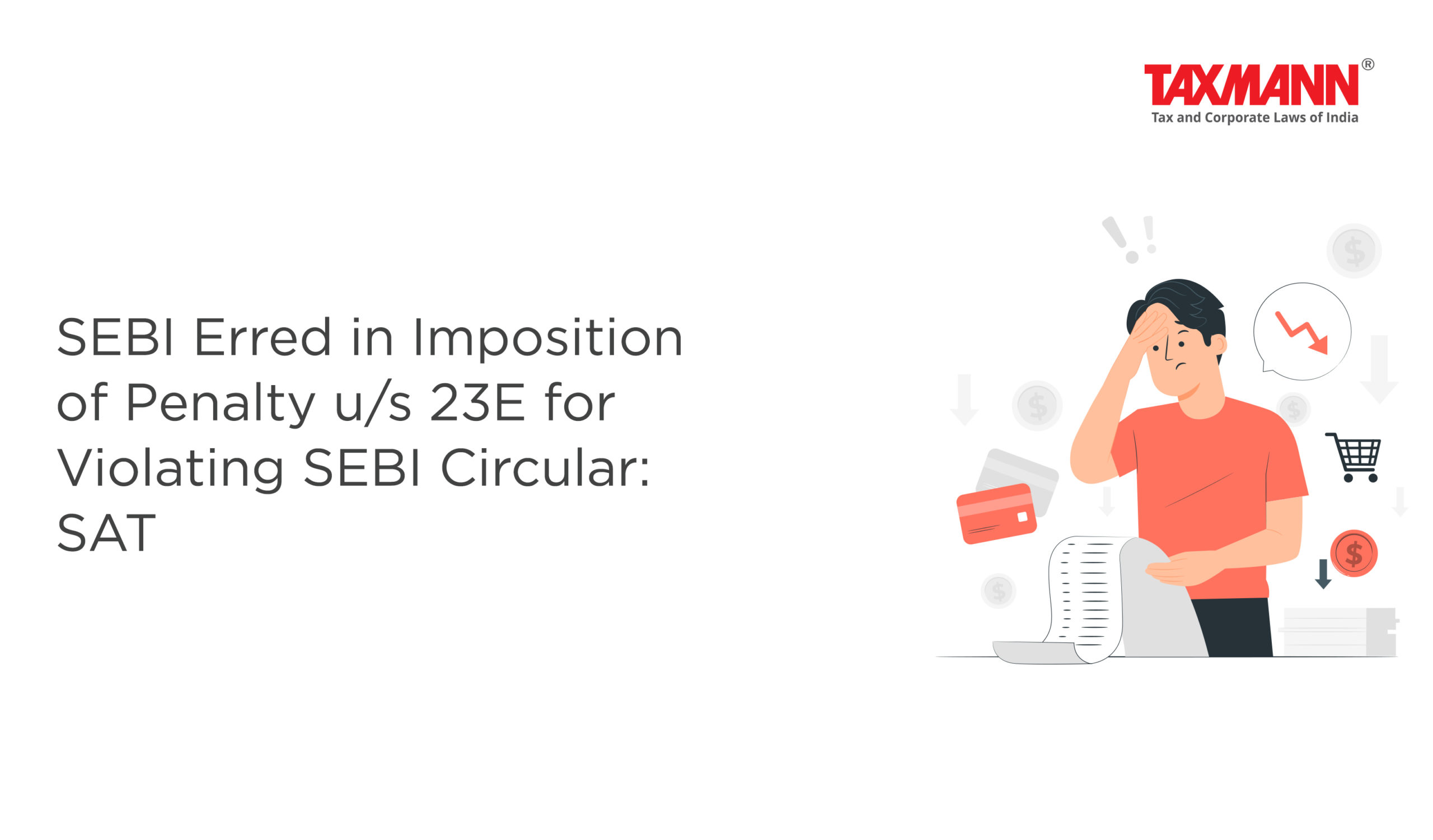SEBI Erred in Imposition of Penalty u/s 23E for Violating SEBI Circular: SAT
- Blog|News|Company Law|
- 2 Min Read
- By Taxmann
- |
- Last Updated on 25 May, 2023

Case Details: IFGL Refractories Ltd. v. Securities and Exchange Board of India - [2023] 150 taxmann.com 154 (SAT-Mumbai)
Judiciary and Counsel Details
-
- Justice Tarun Agarwala, Presiding Officer & Ms Meera Swarup, Technical Member
- Nitin Jain, S.K. Singhi & Ankur Singhi Advs. for the Appellant.
- Sumit Rai, Ravishekhar Pandey, Nishit Dhruva & Ms Shefali Shankar Advs. for the Respondent.
Facts of the Case
In the instant case, investigation by the Securities and Exchange Board of India (SEBI) revealed that the appellant Company had violated provisions of SEBI Circular dated 18.10.2019 and SEBI imposed a penalty of Rs. 5 lakhs for violation of section 23E of the Securities Contract (Regulation) Act, 1956.
Section 23E of the Securities Contract (Regulation) Act, 1956 is read as under:
23E. Penalty for failure to comply with provision of listing conditions or delisting conditions or grounds.
If a company or any person managing collective investment scheme or mutual fund, fails to comply with the listing conditions or delisting conditions or grounds or commits a breach thereof, it or he shall be liable to a penalty not exceeding twenty-five crore rupees.
Pursuant to the order of SEBI imposing the penalty of Rs. 5 lakhs for violation of section 23E of the Securities Contract (Regulation) Act, 1956, an appeal was preferred with the Appellate Tribunal i.e., Securities Appellate Tribunal (SAT).
SAT Held
The SAT observed that since in instant case, violation, if any, committed by appellant was of circular and had nothing to do with violation of listing agreement or listing conditions under section 23E, imposition of penalty under section 23E was patently erroneous, perverse and had been passed without any application of mind.
The Securities Appellate Tribunal (SAT) held that the impugned order of SEBI was to be quashed on payment of cost of Rs. 50 thousand to be deposited by SEBI before Registrar.
For the reasons stated aforesaid, the SAT further held that the impugned order cannot be sustained and was quashed on payment of cost of Rs. 50,000/- to be deposited by the Respondent before the Registrar of this Tribunal.
List of Cases Reviewed
-
- Suzlon Energy Ltd. v. SEBI [2021] 127 taxmann.com 333 (SAT – Mum.) (para 11) followed.
List of Cases Referred to
-
- Suzlon Energy Ltd. v. SEBI [2021] 127 taxmann.com 333 (SAT – Mum.) (para 8)
- Union Of India v. Kamlakshi Finance Corporation Ltd. [1992] taxmann.com 16 (SC) (para 11).
Disclaimer: The content/information published on the website is only for general information of the user and shall not be construed as legal advice. While the Taxmann has exercised reasonable efforts to ensure the veracity of information/content published, Taxmann shall be under no liability in any manner whatsoever for incorrect information, if any.

Taxmann Publications has a dedicated in-house Research & Editorial Team. This team consists of a team of Chartered Accountants, Company Secretaries, and Lawyers. This team works under the guidance and supervision of editor-in-chief Mr Rakesh Bhargava.
The Research and Editorial Team is responsible for developing reliable and accurate content for the readers. The team follows the six-sigma approach to achieve the benchmark of zero error in its publications and research platforms. The team ensures that the following publication guidelines are thoroughly followed while developing the content:
- The statutory material is obtained only from the authorized and reliable sources
- All the latest developments in the judicial and legislative fields are covered
- Prepare the analytical write-ups on current, controversial, and important issues to help the readers to understand the concept and its implications
- Every content published by Taxmann is complete, accurate and lucid
- All evidence-based statements are supported with proper reference to Section, Circular No., Notification No. or citations
- The golden rules of grammar, style and consistency are thoroughly followed
- Font and size that’s easy to read and remain consistent across all imprint and digital publications are applied



 CA | CS | CMA
CA | CS | CMA
